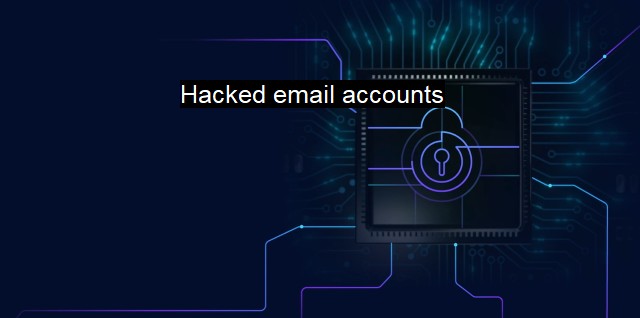What are Hacked email accounts?
Protecting Your Email Accounts from Today's Most Common Breaching Techniques
Hacked email accounts refers to an unauthorized access or breach into users' unique email systems to either carry out illicit activity or steal sensitive information. The term surfaces from the sphere of cybersecurity, emphasizing the importance of safeguarding electronic mail accounts (email) from potential cyber threats. Today's interconnected world of communication via computers and smart devices makes cybersecurity more relevant than ever as methods of cyber intrusion become more sophisticated over time.As sophisticated as technology might be, most hackers aren’t attacking hardware to breach cybersecurity protocols; they’re exploiting human error to hack into systems. Email presents a direct line of attack with the user typically being the weakest link in the security chain. The usual way a hacker will approach an email account involves some form of social engineering or basically fooling the user into disclosing login credentials. Phishing - a method where a hacker impersonates a trustworthy entity to steal sensitive information, including passwords, is the most common tactic.
Upon success, the hackers may alter an account’s behaviors such as settings to fully control the hacked email account. Typically, these changes intend to favor the hacker, allowing them to exploit the compromised account as long as possible. For instance, a hacker might setup forwarding rules to monitor the victim’s messaging patterns and correspondence before launching further attacks on other accounts or individuals.
This illicit intrusion of an email account might create severe implications. Predominantly, the affected user's privacy is breached, leading to potential emotional distress. More importantly, a hacked email account can become a goldmine for cybercriminals in terms of personal data, banking info or even corporate espionage. A single breach could potentially put everything in one’s life at risk; ranging from personal to business relationships, finances to even one’s identity might be susceptible to illicit exploitation by the hacker.
There are preventative measures to reduce the risk of having a hacked email account. One major method is the utilization of antivirus software and other security software tools to detect, prevent and remove malicious activities in users’ systems. A potent antivirus application renders certain cyber threats harmless, scans files for potential malicious behavior, and more. They often double up as all-round cybersecurity suites equipped with anti-spam, anti-phishing and anti-malware attributes.
Intelligent user practices including email management behaviors play a significant role in cybersecurity. Emails from unfamiliar sources should be treated with suspicion, particularly if they prompt for personal details or account verification. Regular change of strong, complex passwords is highly recommended to repel brute force password attempts by hackers. Enabling multi-factor authentication (MFA) can be immensely useful; even when the password is compromised, without the second factor (which could widely range from special codes, biometrics or even physical tokens), a hacker would fail in their full attempt to breach the email system.
As much as it is a digital issue, the human element in tackling hacked email accounts remains significant. Education and awareness regarding contemporary cyber threats is fundamental. Businesses should offer cybersecurity training to employees, with special focus on how to responsibly use email, create robust passwords and remain wary of electronically-transmitted manipulative messages. The fight against the hacking of email accounts should be a multifaceted endeavor, one anchored in maintaining robust practices and systems for enhanced digital safety.
a hacked email account represents an illicit intrusion into one's private correspondence, sent via the internet. This cybersecurity threat may bring potentially catastrophic ramifications if not addressed adequately. An email user must therefore capacitate themselves with pertinent cyber threat knowledge, beneficial email practices and robust antivirus or anti-malware applications to ensure they are not an easy target for hackers.

Hacked email accounts FAQs
How can I tell if my email account has been hacked?
You may notice unusual activity, such as emails you did not send or new contacts that you did not add. Also, if you are unable to access your email account, this could be a sign of a hack.What should I do if my email account has been hacked?
The first thing you should do is change your password immediately. Make sure to use a strong, unique password that you have not used before. You should also notify your email provider and enable two-factor authentication to add an extra layer of security.Can antivirus software protect my email account from hacks?
Antivirus software can help protect your computer from malware that can lead to email hacks. However, it is not a guarantee that your email account will not be hacked. It is important to practice good cybersecurity habits, such as regularly updating your software and avoiding suspicious emails.How can I prevent my email account from being hacked in the future?
There are several steps you can take to protect your email account, including using strong passwords, enabling two-factor authentication, updating your software, avoiding suspicious emails, and not sharing sensitive information online. It is also a good idea to regularly check your account activity to ensure there is no unauthorized access.| | A | | | B | | | C | | | D | | | E | | | F | | | G | | | H | | | I | | | J | | | K | | | L | | | M | |
| | N | | | O | | | P | | | Q | | | R | | | S | | | T | | | U | | | V | | | W | | | X | | | Y | | | Z | |
| | 1 | | | 2 | | | 3 | | | 4 | | | 7 | | | 8 | | |||||||